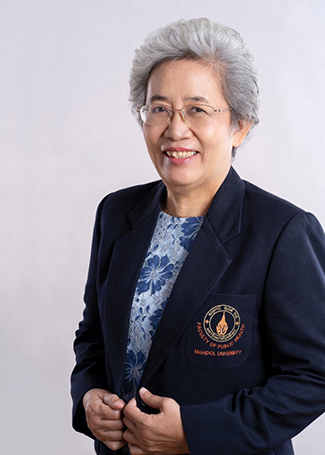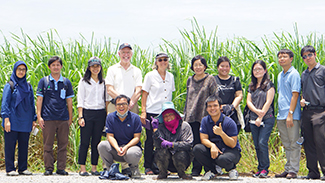Studying the effects of pesticides on Thai farmers and their families
May/June 2023 | Volume 22 Number 3
 Photo credit: Pornpimol Kongtip/Mahidol UniversityDr. Pornpimol Kongtip
Photo credit: Pornpimol Kongtip/Mahidol UniversityDr. Pornpimol Kongtip
Dr. Pornpimol Kongtip has served as a faculty member at Mahidol University, Thailand, for over 20 years where she chairs the Ph.D. program in occupational health and safety. Kongtip earned a Ph.D. in occupational health from McGill University, Canada, and an MS in biochemistry from Chulalongkorn University, Thailand. Her research focuses on occupational and environmental exposure assessment and biological monitoring in the general population and in workers in Thailand, with special emphasis on agriculture.
Tell us about the GEOHealth Hub project.
The project, which ends in July 2023, is a collaboration between Mahidol University in Thailand and University of Massachusetts Lowell in the U.S. It began with a study on the neurobehavioral effects of in-utero pesticide exposures on child neurodevelopment. Next, a GEOHealth Hub planning grant looked at the health risks among Thai healthcare workers and others, including agriculture workers. The Hub, funded for research and training, began in 2015.
The focus has been to examine if pesticides alter the endocrine system, including thyroid hormone levels and cortisol levels, as well as their impact on metabolic biomarkers associated with metabolic syndrome and chronic disorders such as cardiovascular disease, diabetes and stroke. Our research has shown that conventional (pesticide-using) farmers have significantly higher BMI, waist circumference, percentage of body fat, and total cholesterol compared to organic farmers, even after accounting for potential confounders such as tobacco and alcohol use. Number of pesticide spray days was associated with an increasing disruption of the hypothalamic-pituitary-adrenal (HPA) axis and depression of the cortisol rhythm in Thai farmers. Pesticide-using farmers have higher thyroid hormone levels than organic farmers, and an increase in cumulative days of spraying is associated with higher levels of certain thyroid hormones.
Overall, the Hub has produced 20 peer-reviewed papers. We've expanded the research capacity at Mahidol to include pesticide biomarker analysis and trained our university staff, the staff of other universities and some employees from the Ministry of Public Health. We'd planned to bring in biomarker research trainees from Vietnam, Laos, and Indonesia but with the pandemic we were limited to providing online-only training. All of these outreach efforts have increased research capabilities in Southeast Asia.
Why focus on Thailand's agricultural sector?
For our Hub grant, we wanted to develop a network of scientists and policy makers to address health concerns where they are needed most. Informal workers, including agricultural workers, account for nearly 63% of Thailand's total workforce yet they lack employee status, as defined under the Labor Protection Act. Typically, they don't work at an employer's premises, they work at home, so they're often considered self-employed or temporary workers. Our research found that most Thai labor laws apply only to formal workers. While there are some laws that protect informal workers, these regulations often lack practical enforcement mechanisms or they're just ineffective—mainly because informal workers don't have employment contracts or awareness of their legal rights.
Informal workers have higher workplace accident rates than formal workers. If they injure themselves on the job, they can access the universal health care coverage provided by the state, but that's it. Overall, Thai social security laws fail to provide informal workers with specific treatment for work-related accidents, diseases, and injuries; unemployment and retirement insurance; and workers' compensation. A special network meeting produced a white paper that identified occupational health gaps and provided recommendations for additional research.
What has surprised you in the research you do?
People have given more attention to the effects of pesticides on children than on workers. For example, one of our projects focused on pregnant women. We collected samples of urine from pregnant women and measured organophosphate (OP) pesticide levels during pregnancy and then measured neurodevelopment in their newborns and 5-month-old children. We found that increasing OP levels in pregnancy were associated with abnormal reflexes and other neurobehavioral measures at birth and reduced cognitive composite scores on the Bayley Scales of Infant and Toddler Development at 5 months. Later, Hub trainees analyzed stored urine samples from pregnant women and meconium samples from newborns for the pesticides paraquat and glyphosate. This was not done specifically to influence the debate on banning several pesticides in Thailand, but it did have impact due to people's concern for their children.
What challenges have you faced as a scientist?
Getting permission from different companies to do research on workers' exposures to different types of chemicals inside their facilities, can be difficult. Many companies don't want you to know about major exposures or to identify health risks associated with work done in their facilities. I started looking at pesticide exposure among rice farmers in 2007 and found that farmers were happy to work with us. I eventually began to study organophosphate exposures in pregnant women, and now I've conducted research in all areas of agricultural health.
One of the most rewarding aspects of our work is that, after four years of discussions, Thailand finally banned the use of the herbicide paraquat and the insecticide chlorpyrifos starting in June 2020, while limiting use of another herbicide, glyphosate. It's difficult to get involved in politics and talk to the media, but it's important to educate politicians and the community about the risks of pesticides.
 Photo credit: Pornpimol Kongtip The GEO Health Hub team in Thailand, a collaboration between Mahidol University in Thailand and University of Massachusetts Lowell in the U.S., began with a study on the neurobehavioral effects of in-utero pesticide exposures on child neurodevelopment.
Photo credit: Pornpimol Kongtip The GEO Health Hub team in Thailand, a collaboration between Mahidol University in Thailand and University of Massachusetts Lowell in the U.S., began with a study on the neurobehavioral effects of in-utero pesticide exposures on child neurodevelopment.
What should future research agendas include?
Industrial accident rates in Thailand are high compared to other countries, so that is an area of concern. We are also facing increasing air pollution, with rising rates of particulate matter 2.5, especially during the winter. In the past we used to think that India had a serious air pollution problem, but these days Thailand is approaching that same level—above the safe limit. The Thailand agricultural sector employs over 30% of the workforce, so widespread and poorly managed use of pesticides presents a potential risk to farmers and their families but also to the general public. If farmers do not apply pesticides at the recommended rates, food residue levels (the amount of pesticide remaining in or on foods) can be quite high. All of these problems are dynamic and need to be studied.
The main agricultural product in Thailand is rice, but we also grow durian, flowers, sugarcane and other fruits and vegetables. Right now, many rice farmers are moving towards organic farming. With the help of the government, they've developed protocols and they take part in team projects and their membership has grown stronger, so we have a lot of organic rice farmers. The same is happening with vegetable farmers because they can get a higher price for organic crops.
My current research focuses on durian. People want to eat durian all year round so farmers, who want higher incomes, are making that happen. Unfortunately, pesticides must be used so durian can be grown off-season and exported.
How would you characterize public health in Thailand & Southeast Asia?
Thailand faces most of the same public health problems as other Southeast Asian countries. We are in the same location and our way of life is not much different than other Asian countries. Still, I believe Thailand has a more competent public health system in that we provide universal coverage and primary care for our people. Even small towns and villages have public health volunteers, and local primary care health workers to care for their communities.
Thailand is in a better position than other countries in our region because of our universal health coverage, which started about 10 years ago. Over time our health system has improved and now the government gives more support than initially. Still, we need to improve these systems for informal and low-income workers.
More information
Updated June 14, 2023
To view Adobe PDF files,
download current, free accessible plug-ins from Adobe's website.
Related Fogarty Programs
Related World Regions / Countries
Related Global Health Research Topics